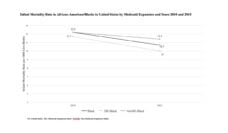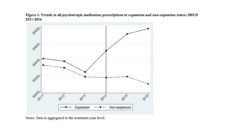Catastrophic medical expenditure is the main cause of bankruptcy in the United States. In 2007, 62.1% of all bankruptcies were for medical reasons. In 2010, some states expanded Medicaid under the Affordable Care Act (ACA) to adults with incomes below 138% of the federal poverty level. As a result, states implementing this legislation succeeded in expanding insurance coverage, reducing the probability of medical and personal bankruptcies, lowering the amount of medical and payday-loan debt, and improving credit scores. In theory, these reductions in the cost of health care among low-income families relax budget constraints and increase consumption of other goods.
My colleagues and I investigated whether or not obtaining health insurance through Medicaid expansion under the ACA helped to reduce worries and stress related to paying rent or mortgage and buying nutritious meals. We examined low-income Americans aged 18-64 years residing in 12 states (including five ACA Medicaid expansion states) in 2015, using data from the Behavioral Risk Factor Surveillance System (BRFSS). In the BRFSS, the respondents were asked: How often in the past 12 months were you worried or stressed about having enough money to pay the rent/mortgage or to buy nutritious meals?
We found that each 10% increase in obtaining health insurance following the ACA Medicaid expansion reduced worries and stress regarding the affordability of nutritious meals by 7.2%.
We found that each 10% increase in obtaining health insurance following the ACA Medicaid expansion reduced worries and stress regarding the affordability of nutritious meals by 7.2%. Also, a 10% increase in access to health insurance reduced worries for paying the rent or mortgage by 8.6 % among low-income people.
Housing, nutrition, and healthcare are each determinant of health. Housing costs can cause financial strain. Financial strain due to housing instability is related to poor health status and related-behaviors, such as poor self-rated health, hypertension, and non-adherence to healthcare and prescription drugs. Poor health resulting from financial strain, in turn, may result in excess health expenditures, creating further financial pressure on family budgets.
Expanding access to health insurance among low-income groups helps to break this cycle. Furthermore, we found that stress or worry related to buying nutritious meals and paying for rent/mortgage was associated with being female, living with children, and being unemployed. In turn, these groups were most likely to benefit from ACA Medicaid expansion.
Among low-income people, improved access to health insurance helps reduce worry and stress associated with being able to afford nutritious meals and pay rent or a mortgage. Expanding health insurance access may have contributed to increasing the disposable income of low-income groups.
Feature image: Alice Pasqual on Unsplash (detail)














